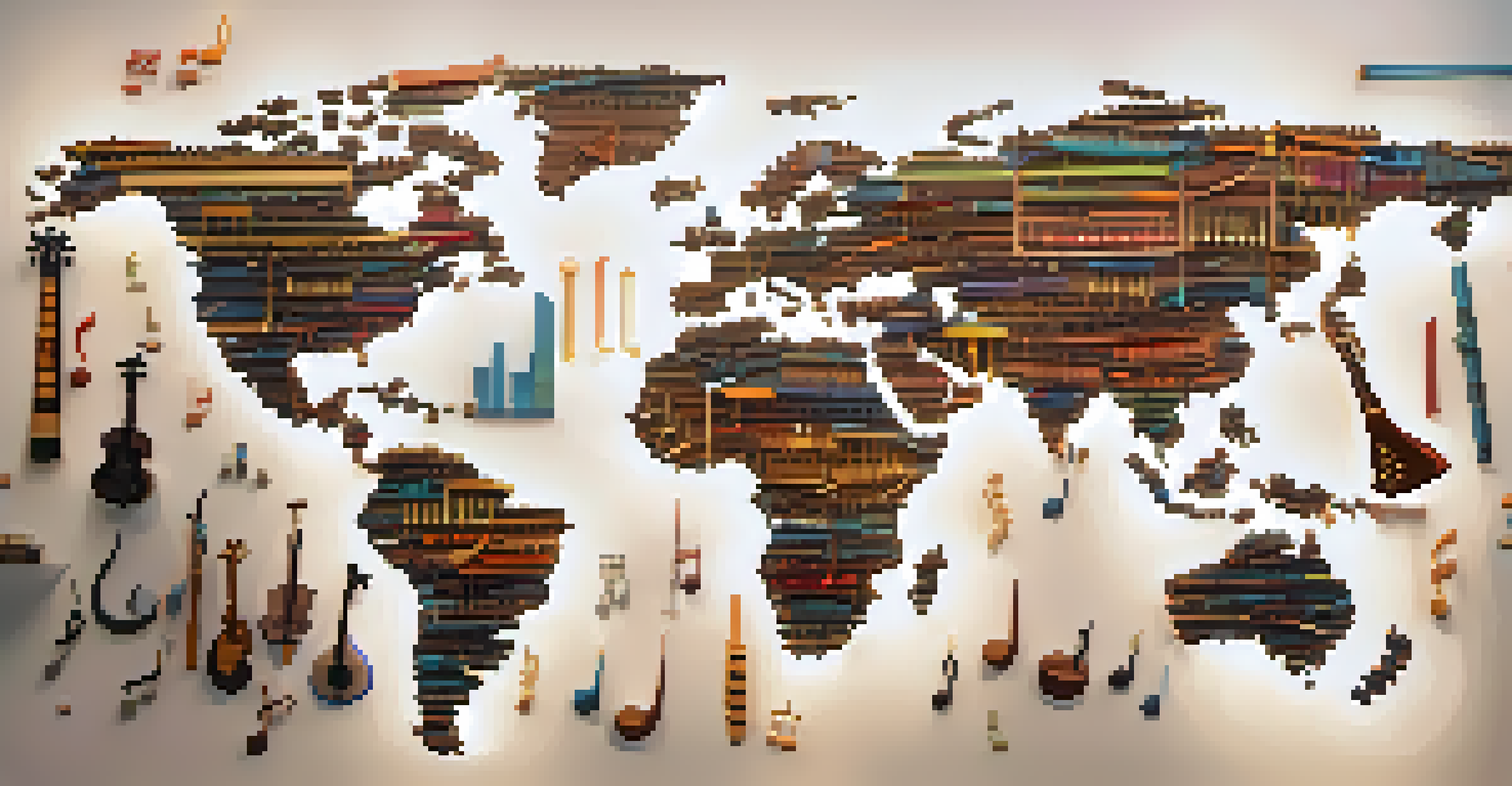The Intersection of AI, Music, and Cultural Identity

Understanding AI's Impact on Music Creation
Artificial Intelligence is transforming the music industry in profound ways. From composing original pieces to analyzing trends, AI tools are helping musicians explore new creative avenues. For instance, platforms like Amper Music allow users to generate entire tracks by simply choosing a mood and style, making music creation accessible to everyone.
Music is the universal language of mankind.
This democratization of music creation means that even those without formal training can experiment with sounds and styles. Imagine a budding artist crafting a unique blend of genres, drawing inspiration from various cultures, all thanks to AI-generated tools. This not only enhances creativity but also fosters a sense of community among diverse artists.
Moreover, AI's ability to analyze vast amounts of data helps musicians understand their audience better. By identifying what resonates with listeners, artists can tailor their music to reflect the cultural identities of their fans, creating a richer, more inclusive musical landscape.
How AI Curates Music and Influences Taste
AI has taken music curation to the next level, making it easier for listeners to discover new artists and genres. Streaming platforms like Spotify use algorithms to analyze listening habits and provide personalized playlists, ensuring users find music that resonates with their cultural identities. This tailored experience makes music more relatable and engaging.

Through AI, listeners can explore music from different cultures without leaving their homes. For example, a user in the United States might be introduced to Afrobeat or K-pop through an algorithmic suggestion, broadening their musical horizons. This cross-cultural exchange fosters appreciation and understanding among diverse communities.
AI Enhances Music Creation Access
AI tools democratize music creation, allowing anyone to compose and explore diverse sounds regardless of their formal training.
However, while AI enhances music discovery, it also raises questions about the authenticity of cultural representation. Are algorithms effectively capturing the essence of a culture, or are they simply reinforcing existing trends? This ongoing debate highlights the need for a balanced approach to AI in music curation.
The Role of AI in Preserving Cultural Heritage
AI is not just about creating new music; it also plays a vital role in preserving cultural heritage. Digital archiving projects use AI to catalog and analyze traditional music forms, ensuring that they are not lost to time. This can include everything from folk songs to indigenous music that may be at risk of fading away.
Technology, like art, is a soaring exercise of the human imagination.
By digitizing and analyzing these musical forms, AI helps keep cultural identities alive and accessible. For instance, AI can identify patterns and similarities in traditional music, offering insights into cultural connections that may not have been previously recognized. This can foster a deeper understanding of a community's history and identity.
Additionally, music educators are using AI to create interactive learning experiences that teach students about different musical traditions. By engaging with AI-driven tools, learners can appreciate the nuances of various cultural sounds, promoting respect and curiosity for diverse heritages.
AI's Influence on Collaboration Across Cultures
One of the most exciting aspects of AI in music is its ability to facilitate collaboration across cultures. Musicians from different backgrounds can connect via AI platforms, sharing ideas and inspirations that blend their unique cultural sounds. This cross-pollination often leads to innovative musical styles that reflect a fusion of identities.
For example, a hip-hop artist might collaborate with a traditional Indian musician using AI tools that allow them to merge their styles seamlessly. These collaborations not only create fresh sounds but also promote cultural exchange and understanding. Listeners are then introduced to new genres, broadening their musical tastes.
AI Curates Personalized Music Choices
Streaming platforms utilize AI algorithms to tailor music recommendations, helping listeners discover and connect with various cultural genres.
However, it's essential to approach these collaborations mindfully, respecting the origins of each musical tradition. As artists innovate, they must also be aware of cultural sensitivities, ensuring that their work honors the diverse influences that shape their music.
Ethical Considerations in AI-Driven Music
As AI becomes more prevalent in music, ethical considerations come to the forefront. Issues like copyright, ownership, and cultural appropriation are critical concerns that artists and producers must navigate. For instance, when AI generates music that resembles traditional sounds, who owns the rights to that creation?
Moreover, there's the question of whether AI can truly understand and replicate the emotional depth of human-created music. While algorithms can analyze patterns, they may lack the cultural context and emotional nuance that a human artist brings to their work. This raises the question: can AI-generated music ever truly capture the essence of cultural identity?
To address these concerns, industry stakeholders must collaborate on ethical guidelines that protect artists and their cultural heritages. By creating a framework that promotes responsible AI usage, the music industry can ensure that innovation does not come at the cost of authenticity.
The Future: AI, Music, and Cultural Identity
Looking ahead, the relationship between AI, music, and cultural identity is poised to evolve even further. As technology advances, we can expect more sophisticated AI tools that enhance creativity while respecting cultural nuances. This could lead to a future where artists can explore new sounds while remaining connected to their roots.
Moreover, AI could play a pivotal role in education, helping young musicians learn about diverse musical traditions from around the world. Imagine a classroom where students can interact with AI systems that not only teach music theory but also immerse them in the cultural contexts of the songs they study.
AI Preserves Cultural Musical Heritage
Through digital archiving and analysis, AI plays a crucial role in preserving traditional music forms and promoting cultural understanding.
Ultimately, the intersection of AI, music, and cultural identity holds limitless potential. By embracing innovation while honoring tradition, we can create a vibrant musical landscape that celebrates diversity and fosters understanding among people from all walks of life.
Celebrating Diversity Through AI-Driven Music
AI has the power to celebrate and amplify the diversity of musical expressions. By making it easier for artists from different backgrounds to share their music, AI fosters a rich tapestry of sounds that reflect the world's many cultures. This celebration of diversity not only enriches the music scene but also encourages listeners to explore and appreciate different cultural identities.
Through AI, musicians can easily collaborate, share, and promote their work on global platforms. This means that unique sounds from remote cultures can gain recognition and appreciation, breaking down geographical barriers. As listeners, we can discover music that resonates with us on a personal level, deepening our connection to the broader world.

In this way, AI acts as both a tool and a bridge, connecting people through the universal language of music. As we embrace this technology, we should also remain committed to celebrating and preserving the cultural identities that inspire and shape our musical experiences.